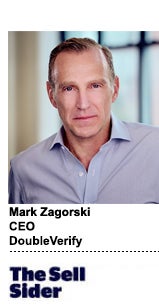“The Sell Sider” is a column written by the sell side of the digital media community.
Today’s column is written by Mark Zagorski, CEO of DoubleVerify.
It’s been a brutal few years for brand advertisers. The relentless onslaught of global crises – from COVID to social unrest to the war in Ukraine – have challenged marketers seeking to drive awareness and sales via advertising while remaining sensitive to real issues and staying true to the brand.
One area that has provided a respite from this noise was confidence in their measurement and verification tactics. It was a safe port in a sea of chaos.
But that sense of comfort may be coming to an end.
As pure play measurement companies like Nielsen continue to lose traction to alternate currencies, and verification of quality and performance become more relevant proxies for driving outcomes, the lines between media and measurement are being blurred. With new measurement players entering the arena, the impact on advertiser trust and the veracity of data is yet to be determined.
Objectivity is a win-win
We have all heard the old saying: “You can’t grade your own homework.” It’s a big reason why third-party measurement and verification emerged. Whether measuring the reach and frequency of a campaign or identifying fraudulent impressions, the value proposition of third-party measurement providers is their independent and objective insight.
In fact, it’s a big reason why formerly closed platforms have increasingly welcomed objective third parties into their systems. Advertiser trust is essential to them, and the stamp of approval from an unbiased analytics partner provides just that. Buyers win and sellers win.
But what happens when the third parties aren’t quite so objective anymore?
Providers are crossing boundaries
Increasingly, measurement and verification providers have come dangerously close to crossing the objectivity “red line.” Whether they are receiving their core data set from an activity unrelated to measurement (a potential use / privacy conflict) or making money from media transactions, their efficacy and independence are in question.
If you have a stake in selling media – at any level – your view of that transaction can always be challenged by those claiming bias. It’s why Consumer Reports, not General Motors, rates the quality of cars. It’s why Nielsen has always been adamant about veering far away from any business that smells like “ad sales” for fear of fouling its $2 billion TV ratings cash cow.
But, recently, companies that sell ads have begun to promote their ability to measure ads as well. And, just as troubling, measurement and verification companies have jumped into the ad sales business. Both moves are problematic. They raise concerns around data integrity and whether there is true separation between those selling units and those measuring them. We have already seen what lack of accreditation can do to advertiser confidence; lack of measurement integrity could be worse.
In a digital ad ecosystem where trust between buyers and sellers is critical, the last thing that should be introduced into the transaction is doubt. Advertisers need to be confident that the verification and measurement of their spend is not impacted by data sourced from a partner that has a vested interest in the transaction. It’s a straightforward ask, and one that will become more prevalent as advertisers begin to better understand the operative motives of their measurement partners.
In the words of founding father James Madison, “No man is allowed to be a judge in his own cause, because his interest would certainly bias his judgment.” Smart words then. Smarter words now.
Follow DoubleVerify (@doubleverify) and AdExchanger (@adexchanger) on Twitter.













